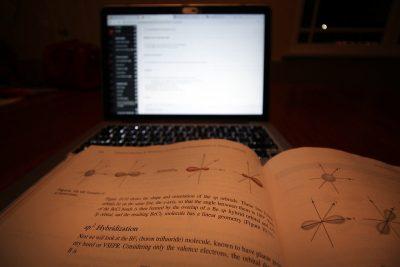
With the Fall semester nearing its end, Boston University students and faculty are reflecting on the ways academics have changed since the pandemic began earlier this year.
One of the biggest differences for BU students was the implementation of Learn from Anywhere, which greatly changed how tests and quizzes can be taken.
Jeremy Menchik, associate professor of international relations, said he has made his exams available online to all students regardless of their location.
“Whether they’re in Thailand, or Indonesia, or the Philippines, or Boston,” Menchik said, “they should be able to take the exam in a timely manner and have them in a comfortable manner.”
Although Menchik said the tests he administered this year weren’t necessarily designed to be harder or easier, he has had to adapt his exams because of the new circumstances that come with online learning.
“I’ve needed to ask questions that students have to think about the response and draw from the material in order to respond,” Menchik said. “They can’t Google their way to an answer.”
However, he said adapting exams to the LfA system has proved useful — he has held open-note and take-home tests this term, which he said are “a learning tool” for students and encourage learning rather than just assessment.
Benjamin Siegel, assistant professor of history, said the switch to online assessments has also impacted what he chooses to test his students on.
In previous years, Siegel said, he quizzed both recall and critical thinking abilities in the classroom. However, this semester he has completely removed the recall component, which he said was now impossible to test given the circumstances.
“It’s not a character fault in students,” Siegel said. “If you have computers in front of you, why would you not look at these things? It makes total sense.”
Siegel said the hybrid format made him seriously consider what he wanted students to take away from exams. He said it led him to focus on engaging students’ abstract thinking instead.
“Much more important than recall, I wanted them to have mastery of the big concepts,” Siegel said. “It’s led to assessments that I think are more meaningful.”
Even with his dedication to adjusting to online assessments, he said, the changes have posed challenges for some students.
“I think it can be harder, particularly for the incoming freshmen this year who didn’t have a chance to see what a normal college exam looked like before,” Siegel said. “I think it’s harder for them to move on to these new models.”
Chemistry professor Tom Keyes wrote in an email he is worried about academic integrity because assessments have been moved online.
“I am concerned about students posting screenshots of an exam to Q&A websites during an exam,” Keyes wrote, “and am doing what I can to make it harder without being overly intrusive.”
Toni Santiago, a freshman in the College of Arts and Sciences, said she struggled with an online midterm for one of her classes.
“For my midterm for my comparative politics class, there was issues with Blackboard with too many people trying to log in,” Santiago said. “At the same time, I think the professors have come up with good systems.”
Santiago said her professors were accommodating throughout the semester.
“My professors and teachers have been completely understanding,” Santiago said. “I know for others, I can’t really speak on that, but some have not been as lenient.”
Jacob Rojas, a senior in CAS, said class accommodations for remote students have been beneficial for studying.
“I think it has made things easier for me,” Rojas said. “I am able to focus more on actually learning something and not having to cram specifically for some topic.”
Rojas said it is important for faculty to take students’ circumstances into account and modify their accommodations accordingly.
“I really hope that teachers and professors will continue to be understanding of the situation that everyone is in right now,” Rojas concluded. “We know it’s not easy for them.”












































































































